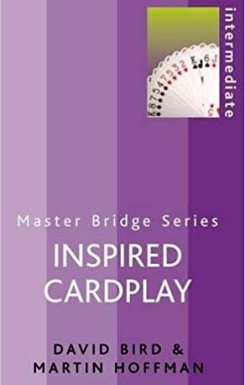Source: Inspired Cardplay

The most familiar type of elimination play is the “ruff and discard elimination”. The defender who is thrown on lead has the choice between playing on a suit, to your advantage, or giving you a ruff and discard.
Dealer South. N/S VUL.
The Auction:
| West | North | East | South |
| Hoffman | Gray | ||
| 1 |
|||
| 5 |
5 |
End |
West Led out two top clubs against 5![]() . Suppose you had held Gray’s cards. How would you have played the contract?
. Suppose you had held Gray’s cards. How would you have played the contract?
Gray ruffed the second club and drew trumps in two rounds. A possible line was to ruff the last club and play the Ace, King and another diamond. If West won the third round he would have to lead into the heart tenace or give a ruff and discard.
Delaying his decision as to how to play the hand, Gray cashed the Ace and King of diamonds without ruffing his last club. West followed with the nine and the Jack. Was it possible that West had started with ![]() Q J 9?
Q J 9?
The risk of and end play would surely have unblocked the queen and jack of diamonds, hoping his partner could win the third diamond with the ![]() 10.
10.
Gray backed his judgement in the matter by switching to a different line of play. He led the ![]() 10 and discarded dummy`s last diamond. Since West had indeed started with only two diamonds he was en played in a different way from declarer’s original intention. If only we could all end our bridge careers with such a well played hand!
10 and discarded dummy`s last diamond. Since West had indeed started with only two diamonds he was en played in a different way from declarer’s original intention. If only we could all end our bridge careers with such a well played hand!
The complete hand:
Esta entrada también está disponible en: Spanish

